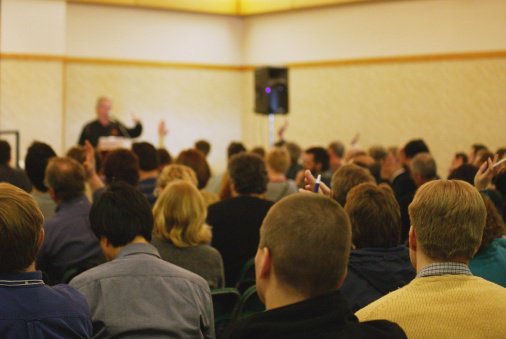Does my Association have to go back to Hosting In Person Meetings?
By: Alexander J. Menendez, Esq.

You may have noticed that the world is reopening from COVID lockdown. With the proliferation of vaccines and falling infection and mortality rates, businesses and local governments are further scaling back restrictions and policies that have been the “new normal” for over a year now. At the same time, a host of new statutory amendments are set to go into effect as of July 1st, and the State of Florida has now come out of a Declared State of Emergency. With this push to reopen, many communities are wondering whether they will have to go back to hosting in person meetings, or whether they can continue to conduct their meetings in whole or in part by videoconference.
The answer, like much right now, is that it depends.
For Meetings of an Association’s Members Without Emergency Powers
Based upon guidance from health officials for safe social distancing, and in response to restrictions on in person gatherings, the overwhelming majority of community association boards exercised their emergency powers to conduct board and membership meetings by telephone and by videoconference. Members were also asked to submit proxy forms to establish quorums and to facilitate efficient voting. There is no doubt that many Members have become accustomed to virtual meetings, and many Members may now even prefer to attend meetings virtually.
There has been disagreement and spirited debate over the extent and the proper implementation of a board’s emergency powers during the pandemic. Much of the confusion will be corrected by statutory amendments that take effect on July 1, 2021, and the amendments should be very helpful when the next, inevitable State of Emergency is declared in Southwest Florida. However, for now, as the Governor’s Declared State of Emergency for the COVID-19 pandemic has expired, and as every day experiences go back to pre-pandemic norms, community associations in Southwest Florida are faced with having to go back to the “old normal,” and having to conduct certain meetings in person.
Despite a relatively large set of statutory amendments to Chapters 718, 719, and 720 of the Florida Statutes that take effect on July 1st, there is no statutory authorization to conduct Membership meetings by videoconference except by way of a board’s emergency powers. Those emergency powers do not go into effect without the Governor declaring a State of Emergency. Arguments can be made to support extending a board’s emergency powers past the end of a State of Emergency. For example, if reasonably necessary to protect the health, safety, and welfare of a community. However, the reality is that a Governor’s Declared State of Emergency in response to a crisis often lasts far longer than the immediate and urgent problems created by the crisis. Without a Declared State of Emergency, an association runs a growing risk that it can no longer justify utilizing emergency powers. In the case of COVID, an association may be very hard pressed to argue that virtual meetings are reasonable, let alone necessary, when grocery stores and other public places have been open for months in Southwest Florida with little to no social distancing or mask requirements being enforced. Without emergency powers authorization, and without the reasonable need to continue hosting virtual Membership meetings, community associations are technically required to conduct Membership meetings in person, or at least provide an option for Members to attend and participate in person. In some cases, a community’s governing documents may even specify the location where meetings must be held.
The Florida Statutes are clear in requiring that a quorum at membership meetings be established by the presence of Members in person or by proxy. For a variety of reasons, it is the author’s opinion at this time that a member’s virtual attendance, without the submission of a completed proxy form, would not be good enough to count the member’s presence toward establishing a quorum. In any case, for numerous logistical reasons, associations may find that a hybrid meeting (with options to attend in person and virtually) simply will not work unless virtual attendees are required to submit proxy forms. As many community associations have learned over the past year and a half, it can be immensely difficult to verify identities and tabulate votes with most of the more popular videoconference applications. Notwithstanding, communities may continue to broadcast their membership meetings by videoconferencing applications so that members can at least observe membership meetings remotely. However, there is no legal obligation to conduct virtual meetings or to provide a virtual broadcast, and there are many reasons why a community may not want to broadcast a meeting. Not the least of which is the fact that it may be impossible to positively identify all virtual attendees. Associations should be cautious and remember that competitive vendors, opposing parties, and any number of non-members can potentially observe a virtual meeting if the meeting ID and passcode are leaked.
For Board of Directors Meetings Without Emergency Powers
Meetings of a Condominium Association Board:
For meetings of a condominium association’s board, s. 718.112(2)(b)5, F.S., provides that:
“5. A board or committee member’s participation in a meeting via telephone, real-time videoconferencing, or similar real-time electronic or video communication counts toward a quorum, and such member may vote as if physically present. A speaker must be used so that the conversation of such members may be heard by the board or committee members attending in person as well as by any unit owners present at a meeting.
Directors may continue to participate and establish their presence for a quorum by calling into a meeting, or by using a videoconference application. However, if any director does not attend a meeting in person, then a two-way speaker must be used so that the conversation may be heard by all in attendance. As such, condominium association board meetings must allow members to attend in person where the meeting is being held.
Meetings of a Homeowners’ Association Board:
Even after the most recent amendments to the Florida Statutes take effect on July 1st, there still remains no provision of Chapter 720, F.S. that directly addresses remote participation at board meetings. Homeowners’ associations must still look to S. 617.0820(4), F.S., which provides that:
“(4) Unless the articles of incorporation or the bylaws provide otherwise, the board of directors may permit any or all directors to participate in a regular or special meeting by, or conduct the meeting through the use of, any means of communication by which all directors participating may simultaneously hear each other during the meeting. A director participating in a meeting by this means is deemed to be present in person at the meeting.” (emphasis added).
Boards should also be aware that s. 720.303(2) F.S., still provides that:
“(a) Members of the board of administration may use e-mail as a means of communication but may not cast a vote on an association matter via e-mail….”
As governing documents may require meetings to be held in person, or at a particular location, Homeowners’ association boards should consult with their association counsel to determine whether their community governing documents technically prohibit meeting remotely. If the governing documents do not require meetings to be conducted in person or at a particular location, then homeowners’ association board meetings may continue to be conducted by videoconference.
Meetings of a Cooperative Association Board:
Prior to July 1st, a cooperative director will still be able to participate and count their presence by telephone so long as a speaker is made available so that those attending in person can hear the director. As of July 1st, S. 719.106(b)(4), F.S., will provide as follows:
“5. A board member or committee member participating in a meeting via telephone, real-time videoconferencing, or similar real-time electronic or video communication counts toward a quorum, and such member may vote as if physically present. A speaker must be used so that the conversation of such members may be heard by the board or committee members attending in person, as well as by any unit owners present at a meeting.”
As such, cooperative board meetings must have an in person presence so that, at a minimum, a two-way speaker can be setup for members to listen in and participate.
A few final pointers. Be careful to note that Chapters 718, 719, and 720 of the Florida Statutes all still provide that a meeting of the board takes place whenever a quorum of directors is gathered to conduct association business. Members also have the right to attend and speak at all open meetings of the board. Boards must be very careful to avoid the temptation of conducting informal and unnoticed meetings via videoconferencing. In addition, association counsel should always be consulted to determine whether a closed board meeting, without Member participation, is permissible.
A note to the reader: This article is intended to provide general information and is not intended to be a substitute for competent legal advice. Competent legal counsel should be consulted if you have questions regarding compliance with the law.
Alexander J. Menendez is an experienced community association and real estate attorney with the Pavese Law Firm, 1833 Hendry Street, Fort Myers, FL 33901; Telephone: (239) 334-2195; Fax: (239) 332-2243. To view past articles, please click “Publications” on our firm website.
Pavese Law has five attorneys Board Certified in Condominium and Planned Development Law; three of only thirty attorneys in the State of Florida who are Board Certified in both Real Estate Law and Condominium and Planned Development Law; and one of only two attorneys in the State of Florida who is Board Certified in both Construction Law and Condominium and Planned Development Law.

